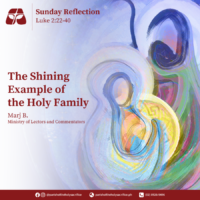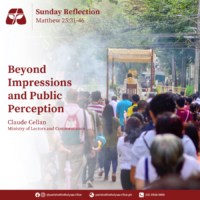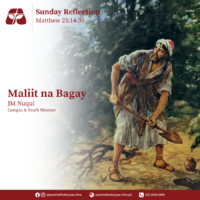Sunday Gospel Reflection
4th Sunday of Lent (Laetare Sunday)
John 9:1-41 | March 19, 2023
Isn’t it Ironic?
JM Nuqui, Campus and Youth Minister
One of the many things which makes life beautiful are ironies. These are moments that leave us shaking our heads—be it in disbelief or laughter. But whatever the case may be, when we look at life at a more light-hearted way, these ironies can actually bring a faint smile to our faces.
My dear brother and sisters, ironies are in fact present throughout Jesus’ life and ministry. From his words and parables to his works and deeds, we see how the light and dark sides of ironies should be taken and understood together lest we miss its intended message. We remember the Parable of the Good Samaritan—he who was alien was nearest to the beaten local. How can we forget the Beatitudes? Remember the time when Jesus preached “he who saves his life will lose it.” And weeks from now, we shall hear of Jesus’ final moment on the cross—a crucified Messiah, mocked for “he can save others but cannot save himself.”
But we need not look far. In fact, our Gospel for today is filled with so many ironies. We see a man born blind, someone considered a sinner because of such a disability. Yet, God’s saving works were revealed through him. Secondly, to our surprise, Jesus used spit and dirt—regarded as sources of impurities—to restore sight to the man, thus making him pure and clean. Furthermore, it was a blind man’s eyes that finally saw Jesus; on the other hand, the Pharisees, who had always thought their sight was the clearest and cleanest, were actually the blindest of all.
And really, ironically, as we celebrate today Laetare Sunday, we feel hatred and repulsion in today’s Gospel rather than joy and celebration over the miraculous healing. There was something beautiful that happened that day: a man blind from birth is now able to see. Pero mas pinili ng mga Pariseo na sumbatan ang taong pinagaling. “This can’t be! Makasalanan ka! Hindi ka pwedeng gumaling” And to Jesus they said, “Hindi ba’t Sabbath ngayon? Bakit ka nagpapagaling?” Sadly, we can almost hear the man blind-now-cured sobbing in frustration from all the interrogation, “But…but I can see.”
Isn’t it also ironic, but more importantly a grace, that in the midst of the subdued liturgical atmosphere, the silence brought by the absence of Gloria and Alleluia, and all those fasting and abstinence, we are given reason to rejoice? My dear brothers and sisters, yes, it may seem rather strange (and even insulting) to tell ourselves to rejoice, especially whenever we are at the darkest points in our lives. But precisely because we are living in ironies in these moments of our lives, there are still, by God’s grace, reasons to Laetare—to rejoice.
During those times when we were at our lowest because of hurt, but still chose the higher road of forgiveness—laetare.
Remember those moments when we were left with almost nothing, but still gave our all—laetare.
When we were given a thousand reasons to quit, yet mustered all the strength to focus on that one good thing to persevere—laetare.
Mga pagkakataon kung kailan tayo naman ang nakabigo, yet decided to continue loving anyway—laetare.
Dear friends, there’s always a dark and light side to Jesus’ ironies. Minsan nakakainis ang mga kabalintunaan sa buhay. “Hayyyy ano ba yan.” Ngunit minsan iniiwan din tayo nitong nakangiti at nagpapasalamat. “Hayyyy buti na lang.” However, unless we embrace both sides, we won’t be getting God’s crucial message for us. For whatever’s left of our Lenten preparations, and as we anticipate the celebration of the Lord’s paschal mysteries, may we hold onto the graces in the ironies of our lives – that, living through these, we can truly say, with hearts rejoicing, “One thing we do know is that we were blind and now we see.”
Artwork:
Christ and the Pauper. Healing of the Blind Man. (2009)
Canvas, oil. 100 x 55
by Andrey Mirnov


